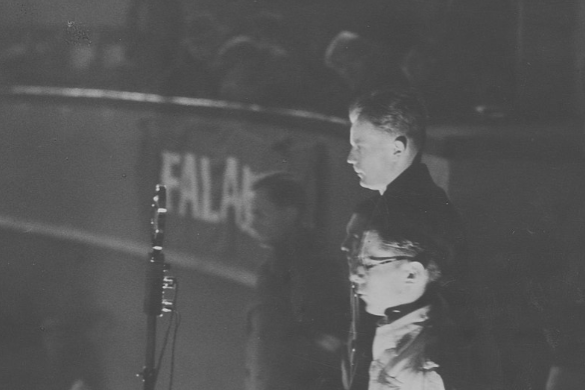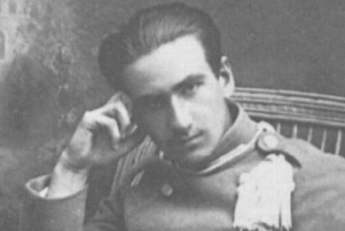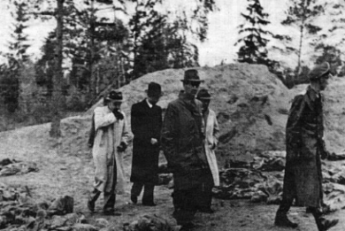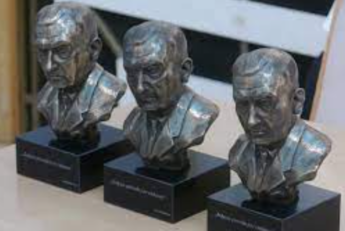
Conflict between Józef Mackiewicz and Dziarmaga
During subsequent occupations, the Polish state had to defend itself. The press had a key influence on the mood of the society. That is why the occupying authorities create numerous reptile shops. In this situation, the secret distribution of underground magazines was also particularly important. Unfortunately, in these circles there were unexpectedly many people who somehow collaborated with the Soviet occupiers, or at least were quite favorable to them. One of such figures was Zygmunt Dziarmaga-Działyński, with whom Mackiewicz had a huge conflict.
Dziarmaga – before the war, one of the main members of ONR Falanga, editor of their magazine and prisoner of Bereza. Barbara Toporska described him as the lowest representative of the human race she had ever met, and Józef Mackiewicz in his article “The course of my “case” is as follows:” he described him as “a man who betrayed me politically during the Lithuanian times”. What was this relationship about? Mackiewicz’s plan was to create an underground newspaper whose aim would be to unite forces to fight against Bolshevism. He got along with Bortkiewicz and a certain Dziarmaga. “Dziarmaga, who proved that he was already at the head of an organization, was to make contact with secret Polish organizations and persuade them to cooperate. We intended to act through secret radio stations, printing leaflets, and organizing an anti-Bolshevik uprising together with Belarusians across the current Lithuanian border. If the Lithuanian society could not be drawn into the action in any way and in this way obtain the tacit approval of the authorities, we were to act in defiance of these authorities, using the method of provocation, striving for a Soviet-Lithuanian conflict, wrote Józef Mackiewicz in 1942 in “The truth in not in the eyes”. Ultimately, this attempt to fight Bolshevism ended with Bortkiewicz becoming a communist and becoming an inspector of the People’s Communist University. And the second co-worker – “Dziarmaga, a Pole from Warsaw, deceived me for a long time with the secret of his actions, in the meantime he grew feathers while distributing […], and later he lived on distributing Soviet newspapers in Vilnius.”
Another, and probably the main element of the conflict was Dziarmaga’s blackmail against Pawłowski, who before the war was in charge of distribution in “Gazeta Codzienna” at Mackiewicz’s, and then in “Prawda Wileńska”. Mackiewicz recommended him as a distribution manager during the German occupation. Dziarmaga was interested in the same position, because he had a monopoly on the distribution of the Polish press in Vilnius and believed that he would have the same one during the German occupation. Finally, he threatened Pawłowski that he would reveal to the Gestapo his Semitic origin, which he had been successfully hiding until then. Pawłowski turned to Mackiewicz for help, and the latter managed to help him, interestingly, in a way similar to Dziarmaga’s actions, i.e. blackmail. He told Dziarmaga that if he revealed information about Pawłowski’s roots, he would denounce him as an NKVD agent. From then on, Dziarmaga’s actions towards Mackiewicz were based on a desire for revenge.
Pawłowski sacrificed part of his distribution earnings for Mackiewicz, even though Mackiewicz had not previously asked for it. It is worth noting that these funds were not German, but came from Polish readers. Dziarmaga found out about this money, admittedly without much detail, but it was enough. Rumors of an allegedly substantial sum of money quickly spread to the public. “Immediately after the publication of my book [the typescript of the novel “The truth is not in the eyes”], a furious campaign against my person begins, and as a result of this campaign, a note in “Niepodległość” entitled “Three gentlemen from “Goniec””. In this note, I am accused of publishing “Goniec” and earning about 300,000 marks (three million rubles!). I lived in the countryside then. By chance, it was during this period that I found myself in extreme poverty bordering on misery. I found out about the publication of the note with a long delay,” writes Mackiewicz later. He reported the matter to the underground court, but it had no effect, and he ultimately disregarded the case, “not even for a moment suspecting that my words could be questioned by any serious Polish body at large”.
The time of war reveals the worst in people, morality loses its value and selfishness grows. The example of Dziarmaga and his conflict with Mackiewicz shows us that the war was fought not only between countries, but also between compatriots. In environments that define themselves as patriotic, we are also able to notice betrayals, blackmail, conflicts that could end in death in the name of material gain. In the case of Pawłowski’s blackmail, Mackiewicz behaved with dignity and even heroism, as he prevented a possible conviction of the person, but he paid for it with the fact that slander began to spread about him, which became widespread in public opinion.
Sources:
www.pogon.lt/o-jozefie-mackiewiczu-i-jego-tworczosci/959-wilenski-goniec-codzienny.html
www.jozefmackiewicz.com/przebieg-mojej-sprawy-wyglada-jak-nastepuje-jozef-mackiewicz/






